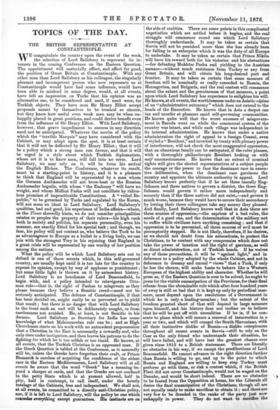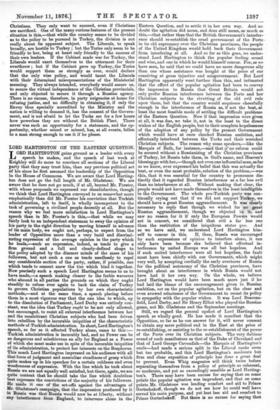THE BRITISH REPRESENTATIVE AT CONSTANTINOPLE.
WE congratulate the country upon the event of the week, the selection of Lord Salisbury to represent its in- terests in the coming Conference on the Eastern Question.
The appointment will materially affect, and affect for good, the position of Great Britain at Constantinople. With any other man than Lord Salisbury as his colleague, the singularly pleasant and incompetent person who now represents us at Constantinople would have had some influence, would have been able to mislead in some degree, would, at all events, have left an impression on Turks that his opinion was an alternative one, to be considered and used, if need were, for Turkish objects. They have seen Sir Henry Elliot accept
proposals meant by themselves to be ironical as sincere, but they know how useful even weak men may be when un- happily placed in great positions, and could derive benefit even from the influence of Sir Henry Elliot. With Lord Salisbury, however, that grave impediment to success in any direction need not be anticipated. Whatever the merits of the policy which the " terrible Marquis" may have considered with the Cabinet, or may adopt upon the spot, it is at least certain that it will not be deflected by Sir Henry Elliot ; that it will be a policy which a strong man can favour, and that it will be urged in a style about which Turkish diplomatists, whose art it is to know men, will fall into no error. Lord Salisbury, we may rely on it, will be from his arrival the English Elchee. The Conference, whatever its result, must be a starting-point in history, and it is a pleasure to think that England will be represented by a man whom the German Ambassador will not brow-beat or the Russian Ambassador beguile, with whom "the Embassy" will have no weight, and whom Midhat Pasha will not conciliate by ridicu- lous promises of impracticable Constitutions. A " veiled Re- public," to be governed by Turks and regulated by the Koran, will not seem an ideal to Lord Salisbury. Lord Salisbury's qualities, bad and good, his experience of India affairs—where, as the Times shrewdly hints, we do not consider principalities estates or peoples the property of their rulers—his high rank both in society and politics, his separate personality, even his manner, are exactly fitted for his special task ; and though, we fear, his policy will not content us, who believe the Turk to be as advantageous to Europe as a bullet to a living body, we can join with the strongest Tory in his rejoicing that England in a great crisis will be represented by one worthy of her position among the nations.
What the policy will be which Lord Salisbury sets out to defend is one of those secrets which, in this self-governed country, are usually kept until it is too late for the country to express its opinion, except by way of applause or punishment ; but some little light is thrown on it by antecedent history. Lord Salisbury is no henchman of Lord Beaconsfield, to begin with, and a policy intended to reinvigorate Otto- man rule—that is, the right of Pashas to misgovern as they please because they believe a Semitic creed—need not be seriously anticipated. The defence of Constantinople, if that has been decided on, might easily be so perverted as to yield that result ; but there is no danger that with Lord Salisbury in the front such an end will be deliberately sought, or from carelessness not avoided. He, at least, is not Semitic in his dreams. Lord Salisbury as Secretary for India has some knowledge of what Mahommedan rule can be ; and as High Churchman starts on his work with no antecedent prepossession that a Christian in the East is necessarily a cowardly serf, who only rises under instigation, and then leaves his patrons to do the fighting for which he is too selfish or too timid. He knows, at all events, that the Turkish Christian is an oppressed man. If the Greek Question is tabled at the Conference, as it assuredly will be, unless the Greeks have forgotten their craft, or Prince Bismarck is careless of acquiring the confidence of the ablest race in the Eastern Mediterranean, Lord Salisbury will at all events be aware that the word "Greek" has a meaning be- yond a sharper at cards, and that the Greeks are not confined to the petty State which is at present allowed, half in pity, half in contempt, to call itself, under the hourly tutelage of the Cabinets, free and independent. We shall not, at all events, be committed to a directly anti-Christian policy, nor, if it is left to Lord Salisbury, will the policy be one which concedes everything except guarantees. His instincts are on
the side of realities. There are some points in this complicated
TOPICS OF THE DAY. negotiation which are settled before it begins, and the real struggle will commence round one which Lord Salisbury thoroughly understands. It may be taken as certain that Servia will not be punished more than she has already been for failing in an enterprise which it was the duty of all Europe to undertake. It may be taken as certain that Prince Nikita will have his reward both for his victories and his abstentions- -for defeating Mukhtar Pasha and yielding to the Austrian menace—without much resistance from Turkey or any from Great Britain, and will obtain his long-desired port and frontier. It may be taken as certain that some measure of freedom will be nominally or really conceded to Bosnia, the Herzegovina, and Bulgaria, and the real contest will commence about the extent and the genuineness of that measure, a point upon which Lord Salisbury has experience to enlighten his will. He knows, at all events, the worthlessness under an Asiatic regime of an " administrative autonomy" which does not extend to the heads of the Executive. He knows that in Asia a despot can tax and murder at pleasure amid self-governing communities. He knows quite well that the worst excesses of misgovern- ment in Baroda went on while the communal system of the country was intact, and while each village was independent in its internal administration. He knows that under a native administration the right of appeal to a foreign Consul, even if styled a " Resident," and invested by treaty with plenary power of interference, will not check the most exaggerated oppression, that an obnoxious family can be extirpated, if the ruler pleases, with a thoroughly philanthropic Resident looking on with naif unconsciousness. He knows that no extent of nominal• rights will give the elected representatives of a subject people the courage or the power to face the dominant race in execu- tive deliberation, when the dominant race garrisons the country and appoints the ultimate authority in appeal. Lord Salisbury knows perfectly that if he set three rascally Eng- lishmen and three natives to govern a district, the three Eng- lishmen would govern it rather more independently and securely than if the three natives did not exist,—and govern it much worse, because they would have to secure their ascendancy by letting their three colleagues take any money they pleased. And finally, Lord Salisbury knows well that in Asia there are three sources of oppression,—the caprices of a bad ruler, the needs of a good one, and the determination of the soldiery not to suffer while civilians have anything remaining ; and that if oppression is to be prevented, all three sources of evil must be peremptorily stopped. He is not likely, therefore, if he desires, as we should not doubt from his antecedents, to protect the Christians, to be content with any compromise which does not take the power of taxation and the right of garrison, as well as direct administration, out of Turkish hands. If he waives any of these precautions, it will be " against light," and in deference to a policy adopted by the whole Cabinet, and not in deference to dreamy and unreal " views " that a Turk, if only he has the chance, will make haste to behave like a Western European of the highest ability and character. Whether he will press as, if the Eastern Question is ever to be solved, he ought to press for the visible emancipation of the Provinces, for their final release from the abominable rule which after four hundred years of sway is still so bad that it is kept up only by periodical mas- sacre, must depend upon the resolutions of a Government in which he is only a leading-member ; but the extent of the freedom granted short of that will depend in large measure upon himself, and his history does not incline us to believe that he will be put off with unrealities. If he is, if he con- sents to plans which will ensure a renewal of insurrection in a year or two, and which will compel the South Slavonians, with all their instinctive dislike of Russia—a dislike conspicuous throughout all recent events in Servia--still to rely on the Czar as the only friend who understands their situation, he will have failed, and will have lost the greatest chance ever given since 1815 to a British statesman. There are literally no obstacles in his way, if we except the predilections of Lord Beaconsfield. He cannot advance in the right direction further than Russia is willing to go, and up to the point to which Russia and England are willing to keep step Turkey must perforce go with them, or risk a contest which, if the British Fleet did not cover Constantinople, would not be waged on the Danube, and would be short indeed. There are no obstacles to be feared from the Opposition at home, for the Liberals all desire the final emancipation of the Christians, though all are not equally ready to make sacrifices to obtain it ; and there are very few to be dreaded in the ranks of the party just now
unhappily in power. They do not want to sacrifice the
Christians. They only want to succeed, even if Christians are sacrificed. One of the many curious features of the present situation is this,—that while the country seems to be divided as to the policy to be pursued in Turkey, the division is not really about its apparent subject. The Liberals, to speak broadly, are hostile to Turkey ; but the Tories only seem to be friendly to her, being at heart only friendly to the success of their own leaders. If the Cabinet made war for Turkey, the Liberals would exert themselves to the uttermost for their overthrow ; but if the Cabinet gave up Turkey, the Tories would support them as strongly as ever, would declare that the only wise policy, and would taunt the Liberals with their determined misrepresentations of the Ministerial meaning. They always intended, everybody would assure us, to secure the virtual independence of the Christian provincials, and only objected to secure it through a Russian agency. There is no excuse, therefore, in party exigencies at home for refusing justice, and no difficulty in obtaining it, if only the Envoy thus specially accredited by the Ministry and the nation is willing to demand it, has the consent of the Govern- ment, and is not afraid to let the Turks see for a few hours how powerless they are without the British Fleet. There never was such an opportunity for a statesman, and the op- portunity, whether seized or missed, has, at all events, fallen to a man strong enough to use it if he please.

































 Previous page
Previous page